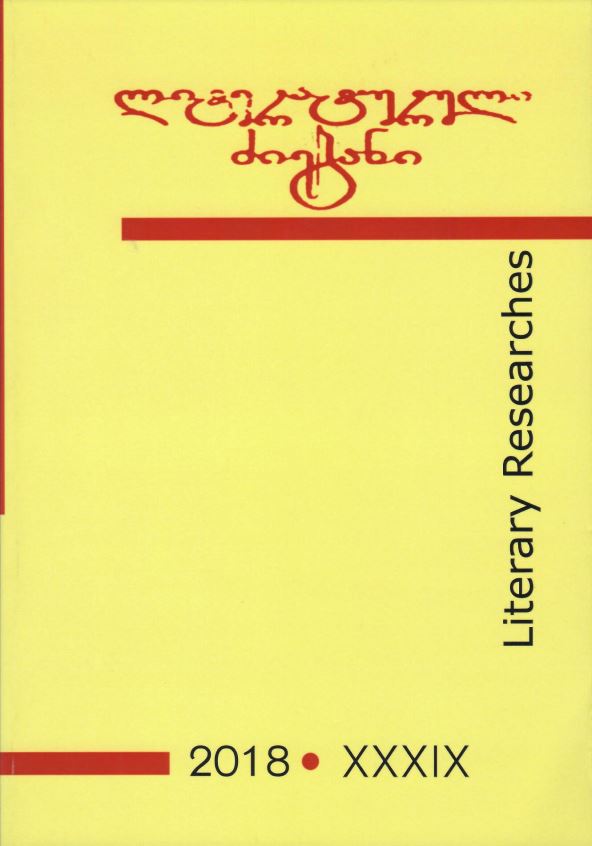Georgian Textual Scholarship and its Integration into the International Scientific Processes
Published 2018-12-20
Keywords
- Textual Scholarship,
- Textual Criticism,
- Definition,
- Georgian Terminology,
- International Processes
How to Cite
Abstract
Georgia has a sixteen-century-old written culture and in order to study the heritage and create perfect scholarly editions it is necessary to have highly developed Textual Scholarship. This field of science was established in Georgia in the 1950-ies when the country was a part of the Soviet Union. By that time Russian influence was very strong and the principles, methodology and terminology of Georgian Textual Scholarship was created according to the Russian models. In the post-Soveiet period it took some time to take a fresh look at the possibilities of the Textual Scholarship developmet. It was quite surprising to find out that the rest of the world did not use the term “textology”, applied quite different disciplinary terminology, methods and technologies.
English term “Textual Criticism” is narrower than “Textology” while the term “Textual Scholarship” is wider. None of them is an exact equivalent. Some scientists consider that the latter is an umbrella term, including such neighbouring fields as: Textual Criticism, Stemmatology, Paleography, Genetic Criticism etc. After some consultations with English textual scholars we came to the conclusion that the term “Textual Scholarship” is still closer to “Textology” than “Textual Criticism” and decided to use this word as an English equivalent for our subject field. As there exist different names of our subject field and there are much more definitions, in order to avoid misunderstanding, we decided to analyse the concepts used in the definitions, sum up and generalize them.
First of all it should be noted that according to the latest classifications “Textual Scholarship”
belongs to the Humanities and not to the “Philology”. What does it study? Different definitions recite the following: fiction, texts of historical documents, literary and folklore works etc. The full list is extensive but still not exhaustive. When textual scholars prepare full scholarly editions of classic authors, they study and publish even note-pad notes, shopping lists and any kind of text belonging to the writer. Therefore we consider that instead of naming all the existing genres and types of documents it will be quite enough to say that Textual Scholarship studies “the texts with historical cultural value”.
What is the object of investigation? Different scholars give different lists, some of them even
contain such an item as “any form of a text”. It is quite right but if the field of the science investigates any form of a text, there is no necessity to name them at all.
What are the goals or objectives of Textual Scholarship? Different definitions suggest some
similar ideas: to reveal authentic version of the text, to reconstruct the text in the form closest to the original, to reveal genealogy, to reconstruct the creative history. All the former definitions are somehow included in the last one. Therefore it will be sufficient to name only “the reconstruction of the creative history”. In another set of goals and objectives textual scholars suggest: critical investigation of the text, its transmissions, variants, interpretations, interventions, to study the history of the text after its creation. We consider that the phrase “to construct a critical text” embraces all kinds of investigations named in the previous items.
As for the phrase that textual researches are aimed at the text edition... Textual studies may be independent, self-sufficient and not aimed at editing. We carry out authorship attribution studies or dating of the texts not only with the aim to put the name and the date beside the text. We do not always take efforts to read deteriorated places of the manuscripts with the purpose to make its new edition. The goals of textual investigations may be quite different. e. g. we carried out a project in which we integrated creation of a biobibliogrpahy with textual studies. The project was not aimed at publishing existing texts but it was very successful as a result of textual investigations. Another extraordinary example: we studied different transmissions of some texts not with genealogical purposes but simply to reveal the name of the person who took care to send the texts to the journal for edition. As we cannot name in the definition all the goals of carrying out textual investigations, we should not name any of them. Editorial goal is a matter of Editorial Studies but not necessarily of Textual Scholarship. They are called “twin disciplines” but still they are independent and their definitions should be different.
To sum up and generalize the independent concepts constructing Textual Scholarship definition it will look like this: Textual Scholarship is the field of Humanities which studies texts with historical cultural value, formulates theoretical concepts connected with the subject, works out principles and methods of the source studies, creative history reconstruction and critical text construction and which carries out these tasks in practice.
After the invention of digital technologies Textual Scholarship began a new life in many
countries and reached great success. In order to make all these novelties accessible for ourselves we should have similar terminological basis. We consider that a great number of English Textual Scholarsip terms will be very helpful for Georgian scholars as well. Among them are: avanttexte, pre-text, peritext, antigraph, apograph, primary and secondary bibliographies, witness, incipit, doodle, substantives, accidentals, dittography, haplography, elimination, expurgation, crux, marginalia, transmission, provenance, sigla, non-nested information, lemma, stemma, folation etc. It is not reasonable to use vast definitions of the concepts all the time if there already exist corresponding terms and it is possible to introduce them. On the other hand, some of the already existing terms need modification of the meaning, e. g.: manuscript, biobibliography, compositor / typesetter etc. Introducion of terminology is not a matter of one scientist or one scientific article. It is very important that all Georgian textual scholars were involved in the process. We are ready to share their ideas and make the steps towards the integration together.

